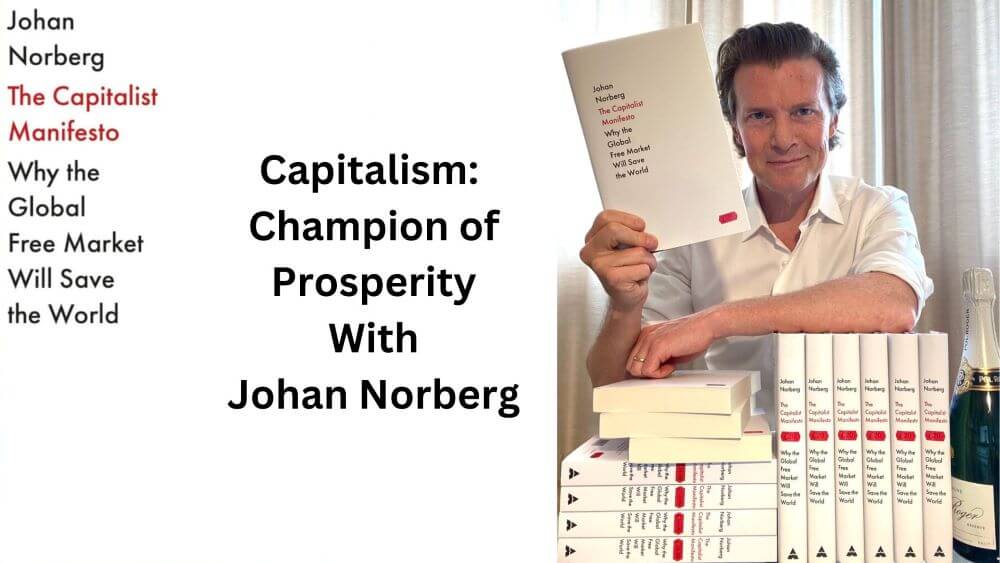Johan Norberg is a Swedish author and historian of ideas, devoted to promoting economic globalization and what he describes as classical liberal positions.
He is the author of:
- In Defense of Global Capitalism (2001),
- Progress: Ten Reasons to Look Forward to the Future (2016), and
- The Capitalist Manifesto: Why the Global Free Market Will Save the World (2023).

Marx and Engels were right when they observed in the Communist Manifesto that free markets had in a short time created greater prosperity and more technological innovation than all previous generations combined. A century and a half later, all the evidence shows that capitalism has lifted millions and millions from hunger and poverty.
Today’s story about global capitalism, shared by right-wing and left-wing populists, but also by large sections of the political and economic establishment, does not deny that prosperity has been created, but it says it ended up in far too few hands. This in turn has made it popular to talk about the global economy as a geopolitical zero-sum game, where we have to fight to control new innovations, introduce trade barriers and renationalise value chains. While, more broadly, capitalism is accused of fuelling glaring inequality, populist revolts, climate change and China’s global conquest.
In this incisive and passionate investigation, Johan Norberg instead states the case for capitalism and the vital role played by the free market in today’s uncertain world. Ultimately, he argues that that a move away from global capitalism would not only squeeze the growth out of the economy but also deepen an already large social exclusion for the vulnerable—for the world’s poor, it would be a killing blow.
Historian of Ideas: is the study of the history of human thought and of intellectuals, people who conceptualize, discuss, write about, and concern themselves with ideas.

Students should study careers where there is high demand for employees and where the salaries are high. Some of those careers are:
- Accounting
- Finance
- Engeneering
- Nursing
There are careers where the student can get out of college and get a job the next day.
as opposed to careers such as:
- Fine Arts
- English
- Philosophy
- Art history
- Gender (women) studies
These are careers where there is very little employment opportunities and most students end up working as baristas in different coffee shops.
People think of the Nordic Countries as socialist countries worth emulating.
- Norway
- Sweden
- Finland
- Denmark
- Iceland
Real socialist countries:
- Venezuela
- North Korea
- Cuba
- China
The Nordic countries are not socialist. They have a free market economy. At one time Sweden increase its taxes on profitable corporations to tackle income inequality, but profitable companies started fleeing the country
Nowadays, Sweden is considered more of a free market society than Canada and the U.S.
Definition of Socialism: Socialism is an economic and political system in which the government owns the means of production.
Socialism seems to have good PR (public relations) because students in almost all industrialized countries claim that they want a socialist government. They march and wave the Che Guevara flag.
Present day capitalism is compared to fictional socialism.
Johan Norberg
Students imagine how great it would be a society where everyone has more or less the same amount of wealth and every one lives in economic prosperity. That sounds better than the reality reality offered to us by any country in the world.
We should compare real capitalism with real socialism.
Johan Norberg
Countries like Venezuela have tried socialism and it has destroyed the economy. People who have any kind of wealth or know-how fled the county, leaving the county in a more miserable situation.
People who believe in socialism change the model every time they get hit with reality. In the 1920s, they believed that the Soviet Union was great.
The cycle of socialism believers goes like this:
- The honey-moon phase when a country transition into socialism, they are in love with the ideal and don’t see the downside.
- The excuse phase when problems begin to appear but believers find an excuse of why is not working out to their liking. There are long lines to get food and other basics, and the smart people start to flee.
- The third phase is denial, and they say that was not the real socialism, when they realize how detrimental it is to human freedoms and dignity.
The idealism moves from country to county. After the Soviet Union, then it was China, then Cuba, and Venezuela.
The biggest problem with Capitalism is the great income inequality that’s created. We feel less of a person when we see someone else earning 100X or 200X what we earn in one year.
A consolation prize that we get when we compare ourselves with people who are a thousand times richer than us is that they are only considerably richer in money but in some other aspects of life, we could be just as wealthy. We could have as much love and respect from our friends, we might be able to enjoy more our leisure time, etc.
Even so called capitalist countries are going backwards. They are creating many new protectionist laws that is impeding free trade.
President Biden is proposing a 100% tariff on Chinese Electric Vehicles.
